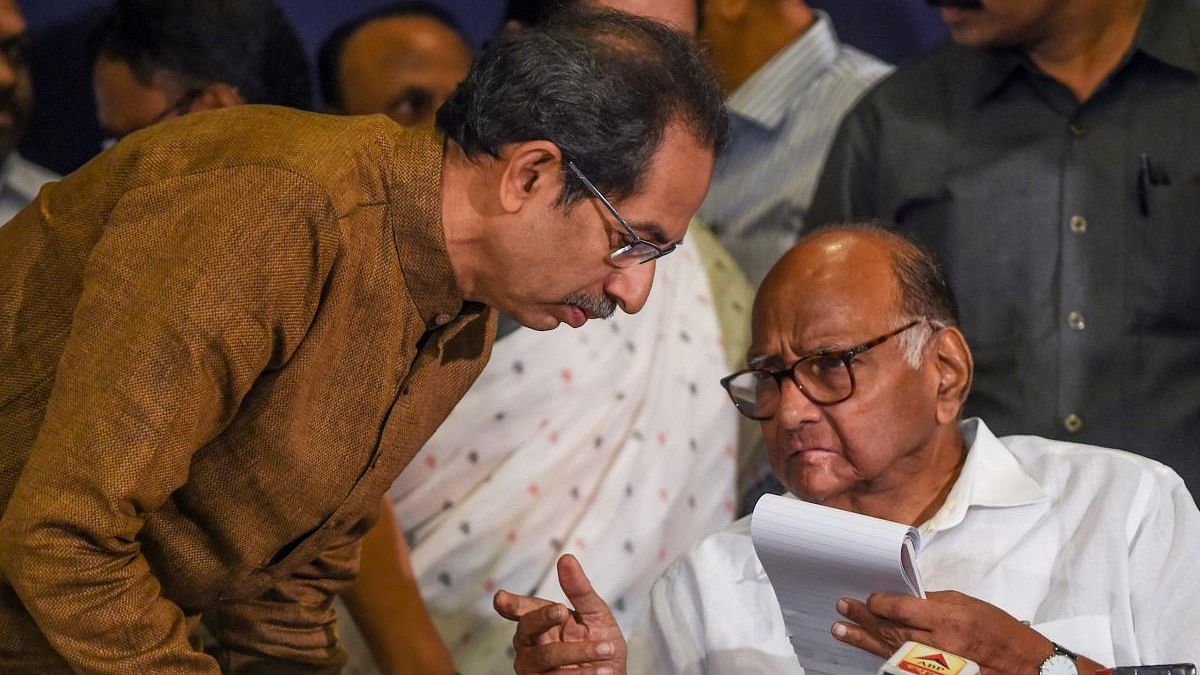
Uddhav Thackeray (left) and Sharad Pawar (right).
Credit: PTI Photo
The way politics has taken a turn in Maharashtra in the past few years has an unmistakable throwback to the days of the great Maratha warrior Chhatrapati Shivaji Maharaj and the attempts to subjugate him and his followers by the most powerful as also the most controversial of Mughal emperors, Aurangzeb.
When Shivaji died, and his son Sambhaji was caught and killed by the Mughals, Aurangzeb thought that it was time to snuff out the rebellion in the Deccan once and for all, and moved to Maharashtra to personally lead the campaign.
However, Shivaji’s two valiant soldiers held fort, and through guerilla warfare brought the mighty Mughal empire to its knees; which led to the death of Aurangzeb on Marathi soil as a broken man. Santaji Ghorpade and Dhanaji Jadhav are heroes in Marathi folklore for rising to the occasion at the most critical time.
Cut to the present, the way Uddhav Thackeray and Sharad Pawar have led the counter-offensive after splits in their respective political parties and attempts to marginalise them is turning out to be a bolt from the blue for the Bharatiya Janata Party (BJP)’s leadership, especially for Prime Minister Narendra Modi and Home Minister Amit Shah.
Amid the fierce electoral battle, the BJP-led National Democratic Alliance (NDA) has changed its focus from targeting Thackeray and Pawar, fearing an adverse fallout. The ruling side is dreading the sympathy factor working in favour of Thackeray and Pawar.
The NDA’s refrain is that the Lok Sabha polls are a tussle between Modi and Congress leader Rahul Gandhi. Nothing more, nothing less. It is intended to brush under the carpet the regional overtones of the Maharashtra campaign at a time when there is a growing impression that Thackeray and Pawar have been wronged.
Thackeray and Pawar are attempting to make the most of this sentiment because they know the tricks and the terrain, and have learnt the tactics and the tantrums of their detractors. Their desire and design are to fight the elections on local issues.
The Marathi word increasingly being used by the Opposition against the BJP is ‘Delhishwar’ meaning ‘the rulers of Delhi’, which has a Mughal connotation, and is not considered auspicious or politically correct in Shivaji’s Maharashtra.
Local BJP leaders have been wearied of the sympathy factor so much that some of them have appealed to the voters not to be swayed by emotions. ‘Don’t vote by becoming sentimental’, is the refrain.
The BJP’s roping in Raj Thackeray, the Maharashtra Navnirman Sena (MNS) chief and estranged cousin of Uddhav Thackeray, to the campaign is signal enough that the battle ahead is fierce, and needs ‘all hands on deck’.
Uddhav Thackeray lacks the charisma of his late father and Shiv Sena founder Bal Thackeray, but more than makes up for that through his political skills. If Bal Thackeray’s word was law, Uddhav Thackeray’s focus is more on ground politics and strategy.
A few months back it looked doubtful whether Pawar and Uddhav Thackeray would get credible candidates to stand from their respective parties because both leaders lost MPs, MLAs, and local leaders in droves when their parties split. But Pawar showed why he is considered the tallest Maratha leader, and now the tide favours his faction of the Nationalist Congress Party and Uddhav Thackeray’s Shiv Sena faction.
Usually, the BJP is quick to take note of the changes in society and adapt its politics accordingly. This time, however, the national party’s politics to dominate Maharashtra is backfiring. The BJP’s tactics to cut its regional allies, the Eknath Shinde’s Shiv Sena faction and the Ajit Pawar-led NCP, to size, has given the Opposition ammunition.
The Maha Vikas Aghadi, comprising Uddhav Thackeray’s Shiv Sena faction, Sharad Pawar’s faction of the NCP, and the Congress, has an edge over the NDA in Maharashtra because the two regional leaders (Sharad Pawar and Uddhav Thackeray) have a good rapport with the Congress and its central leadership.
Like Santaji and Dhanaji in the 17th century, Uddhav Thackeray and Sharad Pawar have been able to retaliate against BJP’s Delhi leadership by focusing on local issues, be a ban on onion exports or the problems faced by farmers — including a spate of suicides. Also, amid the vexed issue of the Maratha reservation, larger issues like a fair deal to the weaker sections and the alleged attempts to tamper with the Constitution do find resonance in the state.
(Sunil Gatade and Venkatesh Kesari are senior journalists.)
Disclaimer: The views expressed above are the author's own. They do not necessarily reflect the views of DH.